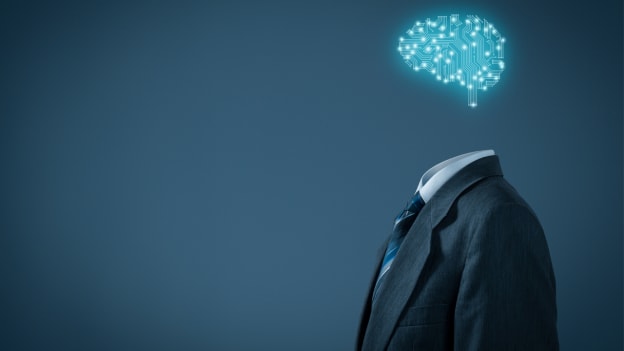Love it or hate it, AI is here to change you

“What we do not understand, we fear. What we fear, we judge as evil,” said Tuvok, a character in “Star Trek: Voyager,” and then, sagely concluded that “…our best defense is knowledge.”
Interestingly, the issue of humans fearing ‘things they don’t understand’ in terms of technology finds its resonance almost half a century ago as well. Mr. SB Mathur (former-Chairman of LIC) recalls in an article published in 2014 in Business Standard that LIC took its first step towards computerization in the 1960s. "There was just one computer in the Mumbai office, a Classic IBM 1040. Another computer was sent to our second biggest office in Calcutta. However, the then state government did not let us use it," he says, implying that it was felt that computers will replace humans and therefore were to be resisted.
The case for AI
There is no doubt that we are witnessing, what is often called the 4th revolution (Agriculture, Industrialization and Internet being the first 3). Not just AI, but the layperson is bombarded with terms like Augmented Reality, Virtual Reality, Blockchains, Data Science, Internet of Things etc. In a way, we have stripped away the innocence from technology to have it staring at us right in the face, a bright white backlight, unblinking and unnerving.
Today, the paradigm has shifted in a subtle yet profound way thus making us wonder, exactly when did this happen? Instead of us changing technology, it is the technology that is changing us. Take a simple example – we are now completely reliant on our mobiles in everyday life. No vacation or outing is complete without posting an update on a host of sites like Facebook, Instagram, Twitter, etc. We are always “on”, plugged-in to a continuous stream of real-time consciousness that seeks to share and comment in equal measure. Often, one is castigated and trolled in an unequal measure where harsh criticism is dished out with reckless abandon and we have become a voyeuristic society.
As HR professionals, this phenomenon has some immediate and longer-term implications not just in terms of the ‘what’ but also the ‘how’ of the way we engage and deploy people practices.
Cappelli, Tambe, and Yakubovich (2018) begin from the basics. They opine that "AI conventionally refers to a broad class of technologies that allow a computer to perform tasks that normally require human cognition, including adaptive decision making.”
With this, one begins with a simple HR question – How does one define a “good employee?” Does this definition apply only to one company, or, can HR leaders create a model that can be applied to others? And, even if a company is able to define who is a “good employee,” will the definition not change with time, business cycles and the dynamics of scale and growth?
Similarly, looking at a ‘good employer’ from the perspective of a potential candidate, one observes that there are a range of socio-psychological variables at play – issues of personal worth and status, the value one appropriates to money, role, autonomy and so on. There are also inherent factors that candidates wrestle with – aspects linked to the status of the company’s brand and role in the eyes of family and friends.
Writing for Raconteur, Oliver Pickup says in AI in HR: freeing up time to be more human (2018) that AI and Data Analytics are being used across HR in areas like Recruiting, HR Strategy, Employee Engagement, Workforce Automation, Corporate Compliance and Investigations, Learning & Development, Diversity and Inclusion, Data Analytics and in Litigation strategies to name a few. An easy example to consider is that “Advances in AI have helped with recruitment’s inefficiencies. Developments in natural-language analysis and semantic understanding can be applied to the recruitment process. Machines can go beyond assessing just the candidate’s résumé and take into consideration a person’s online presence, the company culture, and overall fit more accurately.”
In fact, it is now being accepted in the Talent Acquisition circles in particular and HR in general, that using AI can go a long way in eliminating bias, being more inclusive and therefore, better for the organization.
There is one final puzzle that still needs to be addressed. Human beings are not particularly good with data, facts, reason, and logic. Witness any typical day on social media where it is often impossible to differentiate between truth and post-truth, news and fake news, freedom of expression and outright prejudices.
The core of human emotions consists of and elicits some of the key behaviors – being fair, broadminded, altruistic, creativity, intuition, and risk-taking inclination, just to name a few. These behaviors have a direct impact on aspects such as diversity and inclusion, coaching and mentoring, leadership development, handling stress, health, and safety at work. From an HR perspective, these are key issues that impact who gets hired (or fired), how organizations articulate performance parameters (ergo, who gets promoted and why); and finally, why would a person seek to stay or leave a company and how can AI help control attrition.
An IBM 2017 study on ‘Extending Expertise – How Cognitive Computing is transforming HR and the Employee Experience’ actually lists down in detail Cognitive science and AI are interconnected to solve the above issues.
“Cognitive systems,” says IBM, “can receive and process unstructured information in ways similar to humans, for example, a cognitive system can quickly examine thousands of hours of HR service center recordings to identify keywords and patterns based on frequency, tone, and sentiment. They grasp underlying concepts, form hypotheses, and infer and extract ideas. They rapidly synthesize information to produce relevant and meaningful responses.
Finally, cognitive systems learn and improve through…interaction… building a deep and broad knowledge base that is always up-to-date. Rather than addressing a static set of rules, cognitive systems read, tag and organize HR content from a variety of sources, allowing employees access to the most accurate and relevant information at any given time.”
The challenge
With the 4th revolution truly underway, there is an intent to sweep away the old and herald a new world order and as HR, we are faced with unique challenges. The first is that many of us are not very tech-savvy. One’s ability to push for a tech agenda is hampered since traditionally, HR has lagged other functions in adopting the technology. After all, how many HR practitioners know and use Agile methodology, storyboarding and sprints to run and manage the day-to-day HR interventions in our functions? Sadly, not many.
Secondly, even today, a typical HR function may offer multiple tools and platforms on which it has implemented differing interventions. For instance, one can be using one tool for Performance Management, another one for HRIS, compensation and so on. Integrating legacy systems to create a composite whole that seamlessly integrates employee data, metrics and predicts experience is generally not the norm.
The third challenge is to actually craft an HR strategy where technology is used both as the differentiator and also consumed to enhance differentiation. For instance, using chatbots is a differentiator and then using AI to mine the queries, answers, patterns, and behaviors that get exhibited by employees when interacting with chatbots to finetune HR interventions is the consumption. There are many organizations that have started this journey, but speed and adoption vary and in certain places, doubts continue to linger.
At a philosophical and practical level therefore, Change is no longer a Constant which can be boxed in. AI has made ‘Change’ a breathing organism, that pulsates with a million possibilities at the same time, it is a technology that views the Universe as a ‘Multi’verse and offers myriad options simultaneously. Employees are now ‘Consumers’ of People Practices and as HR leaders we are being called to become nimble in playing a game that is rearranging itself even as we play it.















